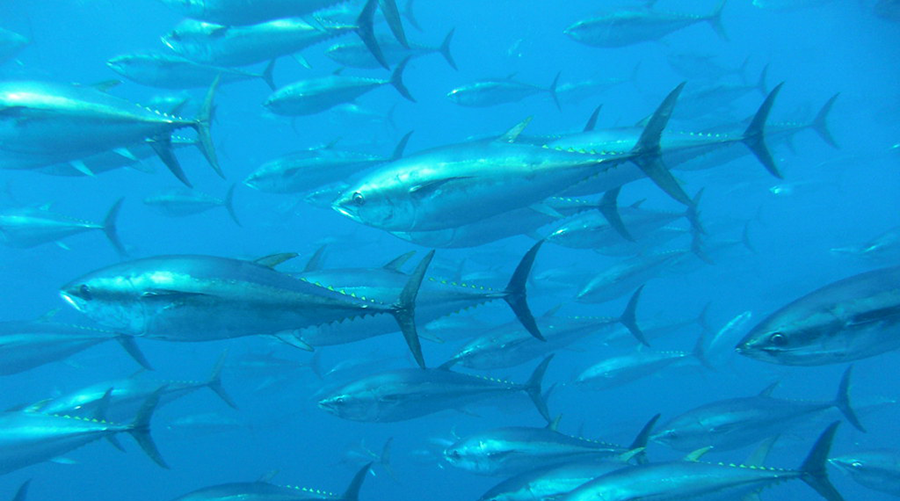
Bluefin tuna. Image by Tom Puchner, Flickr
Extractive activity in international waters – including fishing, seabed mining, and oil and gas exploitation – should be banned forever, according to top scientists.
The high seas, the vast international waters beyond national jurisdiction, cover 43 per cent of the planet’s surface and two-thirds of its living space. Yet they remain largely unprotected and increasingly threatened by overfishing, climate disruption and the rising interest in deep-sea mining.
In a new comment paper published in Nature, “Why we should protect the high seas from all extraction, forever,” the researchers argue that all extractive resource use in international waters, including fishing, seabed mining, and oil and gas exploitation, must either end, or not begin, to prevent irreversible damage to marine biodiversity, the global climate, and ocean equity.
A permanent ban would also be a decisive step toward achieving the goal of protecting 30 per cent of the world ocean by 2030, as set out in the Global Biodiversity Framework agreed in 2022.
The paper includes contributions from some of the world’s most influential scientists and thinkers, including:
● Sylvia Earle, pioneering oceanographer, National Geographic Explorer and Founder and Director of Mission Blue
● Johan Rockström, leading climate scientist and Director of the Potsdam Institute for Climate Impact Research
● Daniel Pauly leading fisheries scientist and Principal Investigator of the Sea Around Us initiative at the Institute for the Ocean and Fisheries, University of British Columbia
● Jessica Meeuwig is a global leader in open ocean ecosystems and Wen Family Chair in Conservation, School of Biological Sciences, University of Western Australia Oceans Institute
● Rashid Sumaila, ocean economist and Killam Professor and Canada Research Chair in Interdisciplinary Ocean and Fisheries Economics at the Institute for the Oceans and Fisheries & School of Public Policy and Global Affairs, The University of British Columbia
● Stuart Pimm, global leader in biodiversity science and Doris Duke Professor of Conservation at the Nicholas School of the Environment, Duke University
● Mark Lynas, award-winning science writer and science advisor with the Climate Vulnerable Forum
● Andrew Forrest, mining executive, ocean scientist, philanthropist and advocate of green economic transition, University of Western Australia, Perth, Western Australia, Australia; Fortescue, Perth, Western Australia, Australia; Minderoo Foundation, Perth, Western Australia, Australia
● Ove Hoegh-Guldberg FAA, leading expert in climate change and the ocean and Professor Emeritus at the School of the Environment, University of Queensland
“Life in the high seas is vital to the ocean’s ability to store carbon and is too important to lose,” said lead author Dr. Callum Roberts, professor of marine conservation at the University of Exeter and lead researcher with the Convex Seascape Survey. “This paper makes the case that we must stop extractive activities in the high seas permanently, to protect the climate, restore biodiversity and safeguard ocean function for future generations.”
The paper highlights four reasons for a ban:
1. Climate stability: The high seas are Earth’s largest and most secure carbon sink. Protecting them is critical to preserving the biological and nutrient cycles that draw down and keep atmospheric CO₂ in check.
2. Biodiversity and fisheries: Species such as tuna, sharks, marlin, squid and krill, which are currently targeted in the high seas, would have a chance to recover and spill over into national waters. Fishing in national waters would support food security and fairer access to resources, particularly for lower-income nations in the global South.
3. Oil and gas: There is no climate justification to exploit fossil fuels in the high seas, given existing reserves on land and in national waters, and rapid development in green energy generation.
4. Deep-sea mining: The industry poses uncontrollable and irreversible risks to the environment and climate. Despite claims that the minerals are essential for green technologies, much larger, proven land-based mineral reserves exist.
“Ending fishing on the high seas would not only have a positive effect on global catch, but would help biodiversity and equity,” said Dr. Daniel Pauly, principal investigator of the Sea Around Us and paper co-author. “The fish from international waters would be caught only when they venture into the 200-mile Exclusive Economic Zones (EEZ) of maritime countries. Because less fish would be caught in the high seas, they would be able to regenerate, and thus a greater number would enter the EEZ’s. This spillover effect would not only be higher than present catches in the high seas, but would also lead to a more equitable distribution of these catches, presently made by a few countries with distant-water fleets.”
While the UN High Seas Treaty, announced in June 2023, offers a pathway to greater protection, its implementation will take years. The authors argue that urgent action is needed now. A full ban on extractive use, they suggest, is both feasible and necessary, echoing the successful precedent set for Antarctica in the 1950s.
“Our research has shown that as much as 54 per cent of the high seas fishing industry would be unprofitable at its current scale without large government subsidies,” said Dr. Rashid Sumaila, head of the Fisheries Economics Research Unit at UBC’s Institute for the Oceans and Fisheries and co-author of the recent study. “On top of this, the high seas are dominated by a small number of fishing countries, which reap most of the benefits of fishing this internationally shared area.”
The paper, published in the journal Nature, is entitled: “Why we should protect the high seas from all extraction, forever.” doi: 10.1038/d41586-025-01665-0.

